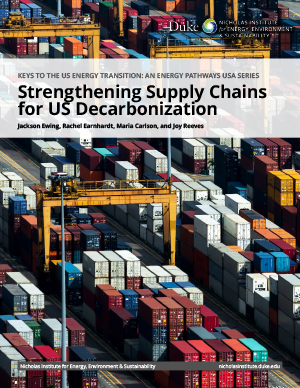In the coming years, the shift to a clean energy economy in the United States will require major public and private investments in new infrastructure. The batteries, solar panels, wind turbines and electrical grid upgrades that will power the energy transition all require access to massive amounts of raw materials.
Energy Pathways USA, an initiative led by the Nicholas Institute for Energy, Environment and Sustainability at Duke University, today released a policy brief that focuses on strengthening U.S. supply chains for these key materials. The brief offers recommendations for accelerating development of domestic supply chains while maintaining ambitious decarbonization efforts.
Here are five key takeaways from the brief:
- The most critical supply chain challenge for decarbonization in the United States is timing. Reaching the country’s target of net-zero carbon emissions by 2050 requires rapidly building and enhancing access to key materials, including steel, lithium, cobalt, copper, nickel and rare earth elements. However, there is currently a discrepancy between domestic raw material production and supply chains moving this material.
- Access to raw materials for clean energy generation, storage and transmission will be crucial for transforming the power sector and, in turn, for economy-wide decarbonization. Acquiring and processing these resources has historically involved complex global supply chains often using just-in-time management strategies. The COVID-19 pandemic and its resulting production disruptions illuminated the fragility of such supply chains.
- China dominates the production of many decarbonization-related materials, giving it tremendous influence over the United States’ ability to reach net-zero goals. Many of these supply chains are predicted to remain in China through 2030, despite efforts in the United States and Europe to speed public-sector initiatives.
- Prioritizing onshoring, “friendshoring,” risk reduction and low-carbon trade will help minimize international influence and time-based supply chain challenges. These priorities will have additional domestic benefits, such as enhancing environmental and social justice, driving domestic economic growth and human capital development and improving energy and economic security. They can also positively affect greenhouse gas emissions, because the embedded emissions of some products are higher when imported than when they are produced domestically.
- The Inflation Reduction Act (IRA) provides incentive structures and domestic content requirements that disrupt the decarbonization supply chain status quo. The IRA uses tax credits as tools to move private markets in decarbonization sectors toward domestic supplies and incentivizes domestic supply chain development in turn. These provisions require further analysis, and strategies for their implementation are essential to the future of U.S. low-carbon development.
The brief is the first in a series of policy papers from Energy Pathways USA that will explore challenges and opportunities for meeting economy-wide decarbonization goals. The findings were informed by a March roundtable discussion in Washington, D.C., that included representatives from congressional offices, federal agencies, the private sector, nongovernmental organizations and think tanks.
“This is a pivotal moment in the U.S. energy transition,” said Brian Murray, interim director of the Nicholas Institute. “The Inflation Reduction Act has tremendous potential to pour federal funding into clean energy projects and catalyze investment from the private sector, which is seeing rapid technological and operational shifts. At this critical juncture, Energy Pathways USA offers a powerful example of how the Nicholas Institute can convene key players and thought leaders to translate research into actionable solutions for energy and environmental challenges.”
About Energy Pathways USA
Energy Pathways USA is accelerating progress toward a net-zero carbon future by developing workable solutions with public- and private-sector partners across multiple key industries.
Convened by the Nicholas Institute, Energy Pathways USA brings together experts from diverse sectors and organizations to explore and analyze current and proposed federal, state and regional policy incentives and the broad range of their potential impacts, including on emissions, costs, technology and consumer behavior. By advancing cross-sectoral dialogue based on robust policy, technology and modeling analyses, this partnership aims to develop actionable pathways to accelerate an equitable energy transition.
Energy Pathways USA works in collaboration with the Energy Transitions Commission as an autonomous regional initiative of that global effort. The initiative is aligned with the goals of the Duke Climate Commitment, which unites the university’s education, research, operations and external engagement missions to address climate challenges.



